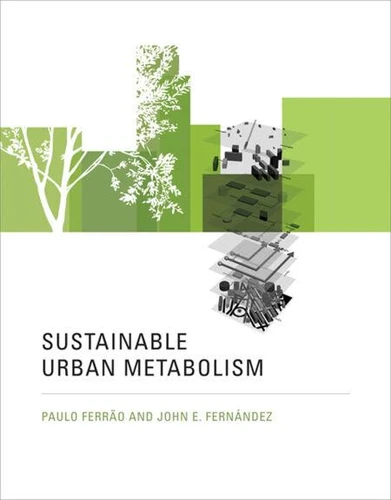Sustainable Urban Metabolism
Par : ,Formats :
Disponible dans votre compte client Decitre ou Furet du Nord dès validation de votre commande. Le format ePub protégé est :
- Compatible avec une lecture sur My Vivlio (smartphone, tablette, ordinateur)
- Compatible avec une lecture sur liseuses Vivlio
- Pour les liseuses autres que Vivlio, vous devez utiliser le logiciel Adobe Digital Edition. Non compatible avec la lecture sur les liseuses Kindle, Remarkable et Sony
- Non compatible avec un achat hors France métropolitaine
 , qui est-ce ?
, qui est-ce ?Notre partenaire de plateforme de lecture numérique où vous retrouverez l'ensemble de vos ebooks gratuitement
Pour en savoir plus sur nos ebooks, consultez notre aide en ligne ici
- Nombre de pages264
- FormatePub
- ISBN978-0-262-31696-5
- EAN9780262316965
- Date de parution30/08/2013
- Protection num.Adobe DRM
- Taille3 Mo
- Infos supplémentairesepub
- ÉditeurThe MIT Press
Résumé
A unified framework for analyzing urban sustainability in terms of cities' inflows and outflows of matter and energy. Urbanization and globalization have shaped the last hundred years. These two dominant trends are mutually reinforcing: globalization links countries through the networked communications of urban hubs. The urban population now generates more than eighty percent of global GDP. Cities account for enormous flows of energy and materials-inflows of goods and services and outflows of waste.
Thus urban environmental management critically affects global sustainability. In this book, Paulo Ferrão and John Fernández offer a metabolic perspective on urban sustainability, viewing the city as a metabolism, in terms of its exchanges of matter and energy. Their book provides a roadmap to the strategies and tools needed for a scientifically based framework for analyzing and promoting the sustainability of urban systems.
Using the concept of urban metabolism as a unifying framework, Ferrão and Fernandez describe a systems-oriented approach that establishes useful linkages among environmental, economic, social, and technical infrastructure issues. These linkages lead to an integrated information-intensive platform that enables ecologically informed urban planning. After establishing the theoretical background and describing the diversity of contributing disciplines, the authors sample sustainability approaches and tools, offer an extended study of the urban metabolism of Lisbon, and outline the challenges and opportunities in approaching urban sustainability in both developed and developing countries.
Thus urban environmental management critically affects global sustainability. In this book, Paulo Ferrão and John Fernández offer a metabolic perspective on urban sustainability, viewing the city as a metabolism, in terms of its exchanges of matter and energy. Their book provides a roadmap to the strategies and tools needed for a scientifically based framework for analyzing and promoting the sustainability of urban systems.
Using the concept of urban metabolism as a unifying framework, Ferrão and Fernandez describe a systems-oriented approach that establishes useful linkages among environmental, economic, social, and technical infrastructure issues. These linkages lead to an integrated information-intensive platform that enables ecologically informed urban planning. After establishing the theoretical background and describing the diversity of contributing disciplines, the authors sample sustainability approaches and tools, offer an extended study of the urban metabolism of Lisbon, and outline the challenges and opportunities in approaching urban sustainability in both developed and developing countries.
A unified framework for analyzing urban sustainability in terms of cities' inflows and outflows of matter and energy. Urbanization and globalization have shaped the last hundred years. These two dominant trends are mutually reinforcing: globalization links countries through the networked communications of urban hubs. The urban population now generates more than eighty percent of global GDP. Cities account for enormous flows of energy and materials-inflows of goods and services and outflows of waste.
Thus urban environmental management critically affects global sustainability. In this book, Paulo Ferrão and John Fernández offer a metabolic perspective on urban sustainability, viewing the city as a metabolism, in terms of its exchanges of matter and energy. Their book provides a roadmap to the strategies and tools needed for a scientifically based framework for analyzing and promoting the sustainability of urban systems.
Using the concept of urban metabolism as a unifying framework, Ferrão and Fernandez describe a systems-oriented approach that establishes useful linkages among environmental, economic, social, and technical infrastructure issues. These linkages lead to an integrated information-intensive platform that enables ecologically informed urban planning. After establishing the theoretical background and describing the diversity of contributing disciplines, the authors sample sustainability approaches and tools, offer an extended study of the urban metabolism of Lisbon, and outline the challenges and opportunities in approaching urban sustainability in both developed and developing countries.
Thus urban environmental management critically affects global sustainability. In this book, Paulo Ferrão and John Fernández offer a metabolic perspective on urban sustainability, viewing the city as a metabolism, in terms of its exchanges of matter and energy. Their book provides a roadmap to the strategies and tools needed for a scientifically based framework for analyzing and promoting the sustainability of urban systems.
Using the concept of urban metabolism as a unifying framework, Ferrão and Fernandez describe a systems-oriented approach that establishes useful linkages among environmental, economic, social, and technical infrastructure issues. These linkages lead to an integrated information-intensive platform that enables ecologically informed urban planning. After establishing the theoretical background and describing the diversity of contributing disciplines, the authors sample sustainability approaches and tools, offer an extended study of the urban metabolism of Lisbon, and outline the challenges and opportunities in approaching urban sustainability in both developed and developing countries.



